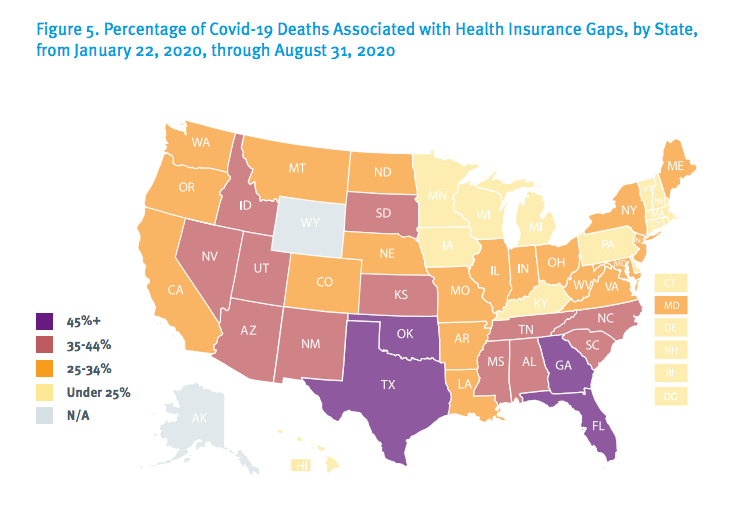One in three Covid-19 deaths may be linked to health insurance gaps
At the beginning of the Covid-19 pandemic, experts pointed to America’s lack of universal health coverage as a potential weakness that could accelerate infections and deaths. Now, about a year into the start of lockdown in the US, we are seeing evidence that inequalities in health insurance coverage were (and still are) linked to the spread of the virus.
A new report from Families USA, a nonprofit organization dedicated to achieving high-quality, affordable health care for all, estimates that health insurance gaps were associated with 44% of the Covid-19 infections and 32% of the Covid-19 deaths that occurred from late January 2020 to the end of August. However, the extent to which coverage affected Covid-19 rates varied widely by state: In Texas, 66% of Covid-19 illnesses were linked to health insurance gaps, while in Massachusetts (which has a system of universal coverage), only 16% of cases were associated with insurance gaps.

Measuring the impact of coverage gaps
How were researchers able to link Covid-19 infections and deaths to gaps in coverage? The Families USA report builds on research conducted by John McLaughlin, Senior Medical Director and Epidemiologist at Pfizer and colleagues. (Families USA received no funding from Pfizer for their report).
McLaughlin and colleagues used county-level data to analyze associations between a broad set of sociodemographic, economic, and health-status characteristics and Covid-19 burden. They found many characteristics were correlated with COVID-19 cases and deaths on a county-wide level, including population density, crowded housing, air pollution, proportion of racial and ethnic minorities, residential segregation, income inequality, proportion of uninsured people, and more.
Their analysis showed a strong correlation between uninsured status and Covid-19 infections and deaths: Even when controlling for all other variables (and there were a lot of variables included), they found that each 10% increase in the proportion of county residents without health insurance was associated with a 70% increase in the county’s COVID-19 cases and a 48% increase in COVID-19 deaths. The FamiliesUSA report applied these findings to estimate the impact of insurance gaps on a national and state level. They caution that the analysis is not a randomized trial and thus cannot prove causation between uninsurance and Covid-19 burden, just association.
Why insurance gaps drive Covid-19
Why are gaps in health insurance coverage associated with higher rates of illness and death? One clear reason is because people who don’t have health insurance often delay or go without necessary care, because they are concerned about the cost. Uninsured patients may not know that their hospital bills will be covered under the CARES Act because some hospitals don’t tell them. There have been reports of uninsured people dying at home or on their way to the hospital because they either sought care too late, or were turned away.
About half of people without insurance do not have a regular care provider — someone who could help them recognize symptoms, get tested, isolate, and advise when or if they should go to the hospital. Insurance status also makes a difference in the care patients with Covid-19 receive and their ability to transfer to hospitals with more resources.
But health insurance gaps not only harm those without insurance; they impact the entire community. Being able to test and trace depends on people seeking care and cases being recorded by a clinician, so if people avoid or can’t access the health care system, infections will spread uncontained. And if those without insurance avoid getting tested because they are worried about the cost (which is a valid concern) they might not be able to get time off work, and could spread the virus to more people.
The report provides a compelling case that inequality in access to care is a public health hazard for us all. The authors conclude, “Leaving millions of people without health insurance can endanger our nation’s overall health and economic security. It is time, finally, to guarantee necessary health care for everyone who lives in the United States.”
